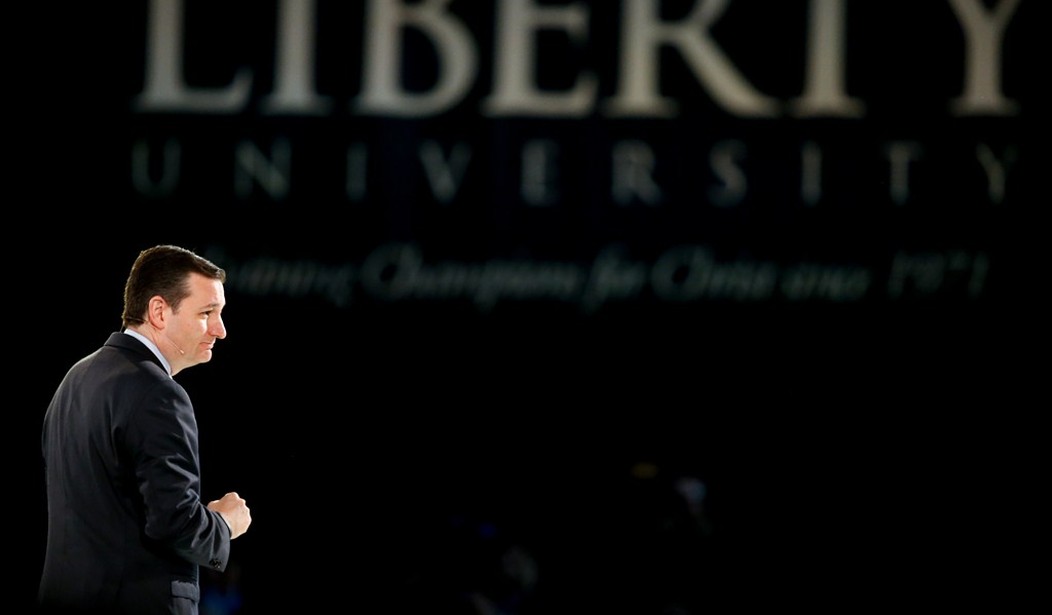In 1979, the year before Republicans nominated Ronald Reagan as their presidential candidate, the Rev. Jerry Falwell and conservative activist Paul Weyrich founded the Moral Majority.
It was at the Christian university in Lynchburg, Virginia, Liberty University, founded by Rev. Falwell, where Sen. Ted Cruz (R-TX) just announced his candidacy for the Republican presidential nomination.
Although Cruz made no reference to the Moral Majority in his remarks, his thinking clearly is where Falwell’s and Weyrich’s was when they founded that organization. That getting a widely politically inactive universe of church going evangelical Christians politically engaged can change America.
Cruz made this explicit in his remarks, noting, “roughly half of born-again Christians aren’t voting…”
Although Cruz’s detractors call him “extreme”, he may not be so far at the margin as they think. Cruz may indeed represent a large unrepresented voter block in a new, highly polarized America.
Approval ratings for President Obama show historically high polarization. In recent data reported by Gallup, Obama’s approval from Democrats stood at 83 percent and at 13 percent among Republicans – a gap of 70 percentage points.
The average gap in approval between Republicans and Democrats for President Carter, whom Reagan defeated, was just 26 points. The average gap for Reagan during his presidency was 52 points. The average gap for Richard Nixon during his presidency was 41 points.
America is a deeply divided nation today. Large parts of our population are barely on the same page regarding how they see the world and how they see our nation.
Recommended
Many, widely manifest in the Tea Party movement, but also among church going Evangelicals, see American freedom centered not in government, but in individuals taking personal responsibility for their lives – lives defined by traditional notions of right and wrong, good and evil.
In sharp distinction, another large cross section, those who continue to support our current president, sees the essence of freedom as moral relativism and government sanctioned entitlement.
An example of this latter stream of America is on display in the latest re-emergence of Monica Lewinsky in a presentation she made at a recent TED conference – a popular event largely attended by those in the technology and entertainment fields – entitled “The Price of Shame.”
Lewinsky drew much sympathy for her appeal against what she called “public humiliation” enabled by the power of the internet and technology.
But the essence of her pitch was moral relativism and entitlement. Although she expressed regret about her affair with Bill Clinton, this certainly was not about personal repentance. Rather, the core of her message is her victimization. The locus of evil, in Lewinsky’s take on things, is with her accusers and not in her personal choices.
Lewinsky lobbies for a compassion that denies sin rather than a compassion that grants forgiveness once a wrong is acknowledged and a new path taken.
Contrast this with the message to America, and particularly to America’s young people, by baseball legend Mickey Mantle at the end of his life.
Playing for the New York Yankees in the 1950s and 1960s, Mantle could do everything on the ball field. He was an American idol.
Weeks before he passed away in 1995, suffering from liver cancer and cirrhosis from years of alcoholism, he held a press conference and appealed to America’s youth, “Don’t be like me.”
“God gave me a body and the ability to play baseball. I had everything I just….. I’m going to spend the rest of my life trying to make it up.”
Ted Cruz is making a bet that the center of gravity of America can and should move. That our youth need to hear that every moment matters, that there is right and wrong, that choices have consequences for which they must take personal responsibility. And that this is what really defines the essence of freedom.

























Join the conversation as a VIP Member